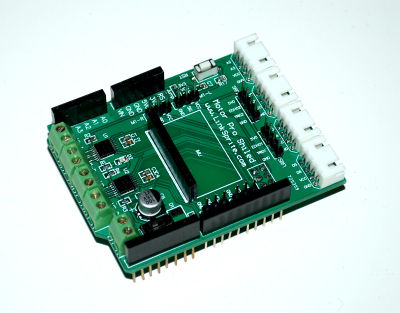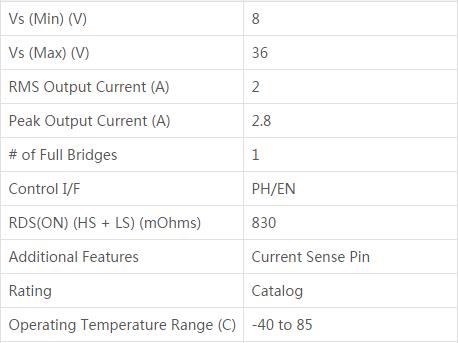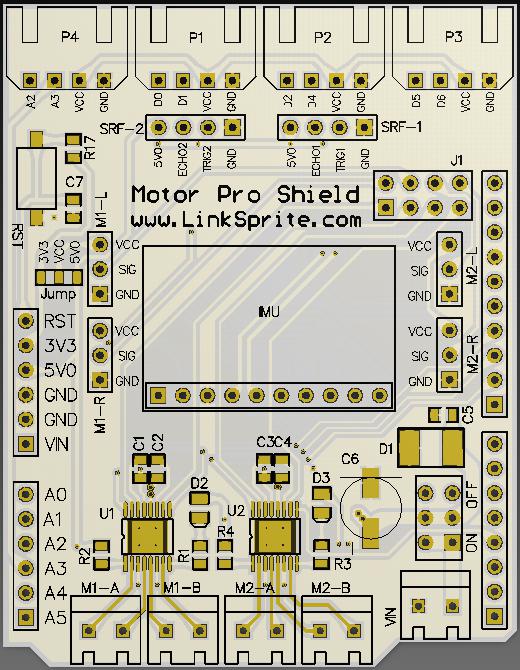Difference between revisions of "Motor Pro Shield"
Qian.zhang (talk | contribs) (→Features) |
(→Introduction) |
||
| Line 2: | Line 2: | ||
Motor Pro Shield is a 4 channel motor driver board which bases on TI - DRV8801. Specifically for pcDuino users to make their own robots, this shield provides rich interfaces. | Motor Pro Shield is a 4 channel motor driver board which bases on TI - DRV8801. Specifically for pcDuino users to make their own robots, this shield provides rich interfaces. | ||
| − | *4 Motor driver interface | + | *4 x Motor driver interface |
| − | *4 | + | *4 xLinker kit interface(ADC、UART、GPIO、PWM) |
| − | *2 | + | *2 xUltrasonic interface |
| − | *1 9- | + | *1 x[http://store.cutedigi.com/9-degrees-of-freedom-imu/ IMU nterface] |
| − | *2 Infrared | + | *2 x Infrared sensor interface |
*Independent switch for motor power supply | *Independent switch for motor power supply | ||
*Over current protection | *Over current protection | ||
Revision as of 03:13, 2 October 2015
Contents
Introduction
Motor Pro Shield is a 4 channel motor driver board which bases on TI - DRV8801. Specifically for pcDuino users to make their own robots, this shield provides rich interfaces.
- 4 x Motor driver interface
- 4 xLinker kit interface(ADC、UART、GPIO、PWM)
- 2 xUltrasonic interface
- 1 xIMU nterface
- 2 x Infrared sensor interface
- Independent switch for motor power supply
- Over current protection
Specification
Spec of DRV8801
Features
Dimensions: 68×53×20mm
Net weight: 24g
Schematic
Usage
Arduino Code
<syntaxhighlight lang="c">
//Motor pro shield test code
int M1_AIN1 = 11; int M1_AIN2 = 14; int M1_BIN1 = 10; int M1_BIN2 = 15;
int M2_AIN1 = 9; int M2_AIN2 = 20; int M2_BIN1 = 3; int M2_BIN2 = 22;
int M1_R = 16; int M1_L = 17; int M2_L = 21; int M2_R = 23;
void Setpin() {
pinMode(M1_AIN2,OUTPUT); pinMode(M1_BIN2,OUTPUT); pinMode(M2_AIN2,OUTPUT); pinMode(M2_BIN2,OUTPUT); pinMode(M1_R,OUTPUT); pinMode(M1_L,OUTPUT); pinMode(M2_L,OUTPUT); pinMode(M2_R,OUTPUT);
}
//****************************** // MA1 and MB1 control function //****************************** void M1A_Forward(int speed) {
analogWrite(M1_AIN1,speed); digitalWrite(M1_AIN2,LOW);
} void M1A_Reverse(int speed) {
analogWrite(M1_AIN1,speed); digitalWrite(M1_AIN2,HIGH);
} void M1A_Stop() {
analogWrite(M1_AIN1,0); digitalWrite(M1_AIN2,LOW);
} /******************************/ void M1B_Forward(int speed) {
analogWrite(M1_BIN1,speed); digitalWrite(M1_BIN2,LOW);
} void M1B_Reverse(int speed) {
analogWrite(M1_BIN1,speed); digitalWrite(M1_BIN2,HIGH);
} void M1B_Stop() {
analogWrite(M1_BIN1,0); digitalWrite(M1_BIN2,LOW);
}
//****************************** // M2A and M2B control function //****************************** void M2A_Forward(int speed) {
analogWrite(M2_AIN1,speed); digitalWrite(M2_AIN2,LOW);
} void M2A_Reverse(int speed) {
analogWrite(M2_AIN1,speed); digitalWrite(M2_AIN2,HIGH);
} void M2A_Stop() {
analogWrite(M2_AIN1,0); digitalWrite(M2_AIN2,LOW);
} /******************************/ void M2B_Forward(int speed) {
analogWrite(M2_BIN1,speed); digitalWrite(M2_BIN2,LOW);
} void M2B_Reverse(int speed) {
analogWrite(M2_BIN1,speed); digitalWrite(M2_BIN2,HIGH);
} void M2B_Stop() {
analogWrite(M2_BIN1,0); digitalWrite(M2_BIN2,LOW);
}
void Motor_test() {
M1A_Forward(100); delay(2000); M1A_Stop(); delay(1000); M1A_Reverse(10); delay(2000); M1A_Stop(); delay(3000);
}
void setup() {
Setpin(); M1A_Stop(); M1B_Stop(); M2A_Stop(); M2B_Stop();
}
void loop() {
M1A_Forward(100); M1B_Forward(100); M2A_Forward(100); M2B_Forward(100);
}
</syntaxhighlight>


